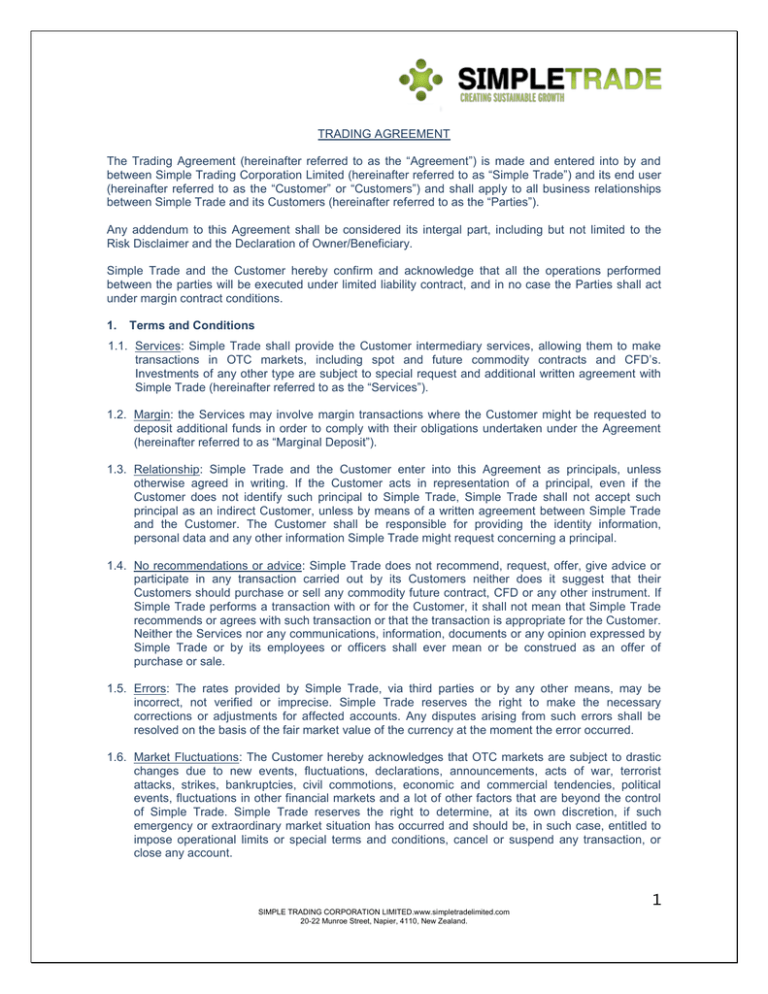In the realm of investing, options trading stands as a powerful instrument for savvy investors seeking to harness market movements and hedge their portfolios. Yet, delving into the world of options can be a daunting endeavor, especially for those unfamiliar with the intricacies of these complex contracts. This comprehensive guide aims to shed light on options trading contracts, empowering you with the knowledge and understanding necessary to navigate this dynamic market effectively.

Image: studylib.net
Options, in essence, are financial instruments that grant the buyer the right, but not the obligation, to buy (in the case of call options) or sell (in the case of put options) an underlying asset at a specified price on or before a predetermined date. This flexibility provides investors with a myriad of opportunities to speculate on market direction, hedge against risk, and generate income through a variety of strategies.
Types of Options Contracts
**Call Options:**
Call options provide the buyer with the right to buy an underlying asset at a specific strike price on or before the expiration date. Investors purchase call options when they anticipate the underlying asset’s price to rise above the strike price, potentially profiting from the price appreciation.
**Put Options:**
Put options, on the other hand, bestow upon the buyer the right to sell an underlying asset at the strike price on or before the expiration date. Investors acquire put options when they expect the underlying asset’s price to decline below the strike price, potentially benefiting from the price depreciation.
The Anatomy of an Options Contract
An options contract comprises the following key elements:
- Underlying Asset: The security or instrument upon which the option contract is based (e.g., stocks, currencies, commodities, indices)
- Strike Price: The price at which the buyer may buy or sell the underlying asset
- Expiration Date: The date on which the option contract expires and becomes worthless if unexercised
- Premium: The price paid by the buyer to the seller to acquire the option contract
Options Trading Strategies
The versatility of options enables investors to employ a diverse range of strategies, tailored to their unique investment objectives and risk tolerance. Some common strategies include:
- Long Call: Buying a call option with the expectation of a rising underlying asset price
- Short Call: Selling a call option, anticipating a decline or sideways movement in the underlying asset price
- Long Put: Buying a put option, anticipating a falling underlying asset price
- Short Put: Selling a put option, expecting a rise or neutral movement in the underlying asset price

Image: www.youtube.com
Tips and Expert Advice
To enhance your success in options trading, it is prudent to bear the following tips and expert advice in mind:
- Thorough Research: Conduct meticulous research on the underlying asset, market dynamics, and potential risks involved
- Options Pricing: Understand how options are priced and the factors influencing premiums (e.g., volatility, time to expiration)
- Risk Management: Employ prudent risk management techniques to minimize losses, such as stop-loss orders and position sizing
- Trade Psychology: Cultivate discipline and control your emotions when making trading decisions
Frequently Asked Questions (FAQs)
Q: What is the difference between an option and a future?
A: While both options and futures are derivative contracts, options provide the buyer with the right but not the obligation to buy or sell an asset, while futures oblige the buyer to buy or sell the asset on a specific date at a predetermined price.
Q: Can options trading be profitable?
A: Options trading can potentially be lucrative, but it also carries substantial risk. Successful options trading demands a combination of knowledge, skill, and prudent risk management.
Q: Is options trading suitable for beginners?
A: Options trading is generally not recommended for beginners due to its complexity and potential risks. It is advised to acquire a solid understanding of financial markets and investment concepts before venturing into options trading.
Options Trading Contracts

Image: www.talkdelta.com
Conclusion
Options trading contracts provide a powerful tool for investors seeking to navigate market fluctuations, hedge risks, and generate income. However, understanding the nuances of options trading is paramount to mitigating risks and maximizing potential gains. By meticulously researching, comprehending options pricing, implementing effective risk management strategies, and adhering to sound trading psychology, investors can harness the potential of options trading to enhance their investment portfolios.
Engage with us in the comments section below if you are interested in learning more about options trading or require further clarification on specific concepts. Share your experiences or queries, and let us embark on an educational journey together in the world of options trading!






